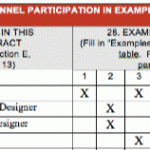 Several Linkedin forums have been debating about cliches in proposals. These conversations devolve into debates about bug dust.
Several Linkedin forums have been debating about cliches in proposals. These conversations devolve into debates about bug dust.
What Is Bug Dust?
Bug dust is defined as elements of your proposal that have no significant influence on whether you win the job or not.
Should you use contractions in your proposals or is that too informal? Nobody f*cking cares. If you think your use, or lack of use, of contractions has any effect on the success of your proposal, you are out of your mind.
If you think whether or not you thank your client for this opportunity to propose impacts their decision to hire you, you are batsh*t crazy.
If you think that leaving too much whitespace on the page is going to make or break your proposal, you are quite mistaken.
These things are all bug dust. And frankly, we spend way too much time discussing them. Spending any amount of time worrying about this stuff is too much.
What Should You Focus On?
Every proposal has a deadline. That means, whether you want to admit it or not, there is a limited amount of time to put it together. So, spend that time on things that truly matter, things that will truly convince the client that your firm is the absolute best choice for this assignment.
So the next time you and your proposal team start debating something, ask a question. Is this bug dust?





No matter what firm I am writing proposals for, I am always amazed at the details technical people think are important to the selection process. I have seen architect teams go through a dozen different samples of what colors the graphics should be but nobody was writing any text! I think it has mostly to do with a desire to avoid those tasks which people don’t like, so they grasp at any detail, no matter how small, to convince themselves that they are being productive.
Bernie,
I’ve had the same frustrating experiences you and many other marketers have had with technical professionals. But it’s not entirely their fault. I think their concerns are logical. It’s hard to believe that clients would not read every word of these documents we put so much effort into.
Just the idea that the stewards of our tax money are not carefully considering ever single word of a proposal for $100K or $100M is concerning to say the least. It’s hard for even me to accept or believe.
Then there is the issue of how their minds work. Engineers, in particular, are very detail oriented people. We should cut them some slack when we expect them to care less about the details.
I’ve learned that when they sit down and have to review a set of proposals, it’s an eye opening experience.
Wow, what a great article! I have always been a fan of people who cut to the chase; however, I am also very detail oriented.
A recent article by BBC News cited millions in losses in online sales due to spelling errors. “Bug dust” has its place, but it is certainly not at the time of proposal development.
Spelling, grammar, and format are important to the outcome of any sales document, but these are decisions that should be addressed at the departmental level, at the time when standards are set for each response.
While a grammatical error or an informality may not lose your bid, in the back of the evaluator’s mind, there is always a question, “if he can’t get the grammar right, how well can he really manage my project?”
The bottom line is that we shouldn’t leave anything to chance.
Deb,
Thank you for reading and the kind words.
Yes, I do believe there is a minimum bar of grammar and spelling that must be reached. That bar is no misspelled words. But there is a bar that you should not go above. I believe that to be an 8th grader’s reading level.
The article you cite (http://www.bbc.co.uk/news/education-14130854) was actually about a single website that had a spelling mistake and changed it. It was not a far reaching study and is only anecdotal evidence at best. Certainly, I would not click a button that said,”bye now!” Unfortunately, we don’t know what the spelling mistake was.
I have actually heard proposal evaluators (at least for legal services) claim grammar plays a huge part in who they choose. To some extent, it makes sense. To another extent, that’s a stupid way to choose your attorney.
So, I agree with you. But let’s be careful not to give spelling errors and grammar errors, or even informality, the same weight when it comes to proposal risks.
I talk more about bugdust here:
http://helpeverybody.wpengine.com/proposal-development/1420-the-difference-between-bugdust-and-a-clear-advantage-in-aec-marketing
And then there is that ghost story about the reviewers faced with sorting through 100 proposals for a short list. What better way to do it quickly than to toss those with spelling or grammar errors in the first few pages?
Diane,
Thank you for posting.
Good point. I go through some of the methods used by proposal evaluators in my book.
Like everything else this work is about striking a balance. Every proposal should be subject to a thorough proof read and sense check. This ensures there are no spelling errors and should establish that the prose used has actually answered the buyers question within the word limits set. Tight word limits should help to get rid of flowery language and make suppliers stick to the point. There’s a lot of truth in the idea that people concentrate on other things in order to avoid having to get words on the page. I worked for a client last year where their internal team had a fixation on what a known other bidder would be putting forward. It took some time to convince them that was something they could not influence and that it was much better to spend time developing THEIR best proposal as a means of winning the business.
John,
Thank you for commenting. I totally agree. 🙂
Great article Matt – and right on the nose! Thanks! S
Thank you Sandra!
I agree with your comments when it comes to responding to a client’s Q&A but disagree with you 100% when it comes to the Executive Summary. Solution, value proposition and aesthetic quality are all EQUALLY important in the Executive Summary.
Anyone out there doesn’t believe that aesthetic quality is a priority better hope their business is happy to sell at low margin. Good use of layouts, consistent application of brand and strong visual themes create feelings of quality, sophistication and professionalism that will set your business apart and enable you to charge a premium when competition is tight, services are commoditised and the industry suffers price compression.
Charles,
I want to make sure I understand what you are saying.
You believe that clients will pay a premium for your service solely based on a nice looking proposal?
Of course not. But if your proposal is all substance and mine is substance and style I’ll have an edge. If yours is wall to wall text and detail and mine is plain language with illustrative diagrams and infographics to highlight key elements of my value proposition I guarantee a decision maker will retain more of what matters about my offer than yours. I’m easier to read, easier to understand and I’ve made the effort to look good. Kind of like polishing your shoes for a job interview. So I guess what I’m saying is, it isn’t bug dust it’s the extra mile. Looking good isn’t everything but it definitely helps if you’ve met all the other criteria.
Thanks! Whether I am reading a proposal as a buyer, or reviewing one as part of the sales team, one of my biggest pet peeves is that completely unnecessary paragraph or page about how “We are pleased to present this proposal and want to earn your business, blah, blah, blah.” People are busy. Respect their time. And your own.
I have certainly seen and written my fair share of sentances that start with the “We are excited about working with xyz,” “We are please to present this proposal,” “Thank you for allowing us the opportunity to bid…”
Anyone have a cool first line opener? Is it silly to start with an lead similar to a feature news story? “It was the best of times. I was the worst of times. Let us make sure your experience is the former not the latter.”
or
“There is a kind of victory in good work, no matter how humble.” Jack Kemp Our company would be proud to count you as client and partner.
Too much?
Chris,
That is utter bug dust.
My department (manager and graphic designer) does not understand the proposals. They think its a graphics al magazine they are designing. I am a graphic designer, but I am a proposal coordinator here. I have been for 5 years. BUG DUST is all they worry about. That and explaining what LEED is when clients ask for it in an RFP. It drives me nuts. We are a national construction company and they waste so much time arguing and discussing this stuff.
I usually start off with a paragraph mentioning something new about them, expansion or I brag on what they have accomplished.
Thank you for the opportunity to present our company and experience to you. We understand that being a leader in the industry requires dedication, diligence, and hard work. With approximately 14 million square feet of leasable space, we know that you have put in that hard work over the last 40 years. We are also very proud of our 32-year history establishing
As in most things, taking an absolute position is folly. Claiming that signs of attention to detail are “bug dust” and in your usage, worthless, is frankly just wrong. (Is that easy enough for you to read?)
You may be too young to know of the TV series entitled Colombo, but it could teach you a thing or two. The starring character was slovenly dressed, seemingly absent-minded, and fuzzy on details. This ruse was, of course, intentional. Fool-hardy criminals discounted the detective and became sloppy themselves — sloppy enough to get caught. Shall I spell out the point? People judge based on appearances. If your proposal is slovenly, with poor grammar, obvious typographical errors, and a general lack of white space, that is the low caliber of product the potential client/customer will expect.
As was pointed out by previous comments, shining your shoes, tying your tie properly, brushing hair, and for God’s sake, brushing your teeth, will make a difference between you and your competition, as will not doing so. Several comments correctly pointed out to you that balance is needed. If you look like a million bucks and don’t have a clue what to do, you will fail. If you are brilliant and look like you live under a highway overpass, societal elements will be prejudiced against you. Regardless of whether this is right, wrong, as it should be, or an outrage, it is nevertheless a truism. Look it up.
Hey Lilah,
You probably need to reread my post. You seem to be stretching my point to an absurd extreme. Attention to detail isn’t bugdust. Bugdust are the things that will not help you win.
I go into great detail defining bugdust. You’ll note that I didn’t mention tying your shoes or Columbo.